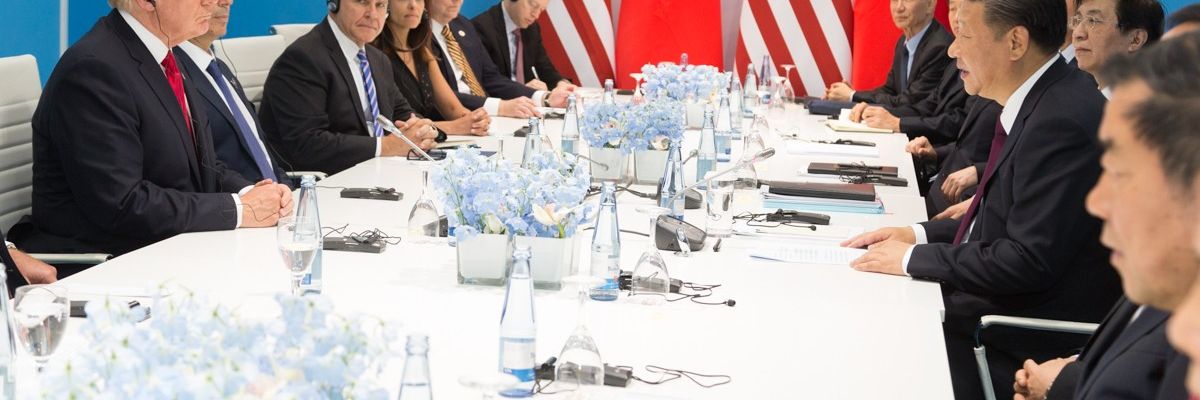If there is one good result of the pandemic and the resulting economic crisis, it may be to remind the U.S. establishment that in the end, the international strength and influence of a country depends on its domestic strength.
No amount of military power or propaganda can compensate for economic, political, and social weakness and division at home. If the United States can assimilate this lesson, it will be in a much stronger position to withstand future shocks like climate change and its consequences. If it cannot, the pandemic will be seen by future historians as another steep downward step in the West’s decline.
This truth was obscured for much of the past three decades by the triumphalism generated by U.S. success in the Cold War. On the one hand, the collapse of Soviet communism was so complete that it appeared to prove beyond question the eternal, self-evident validity of the democratic capitalist political and economic model that was embodied in Francis Fukuyama’s notorious work “The End of History.”
Ironically, Fukuyama’s idea of perfected liberal capitalist democracy echoed in many ways the Soviet doctrine of “Real Achieved Socialism” in the USSR. The effect in both cases was to deprive elites of capacity for self-reflection and self-criticism, and therefore of capacity to think about reforms. Why reform an already perfect system?
Ronald Reagan was held to have played a key part in the collapse of communism through a combination of his fervent anti-communist ideological rhetoric and his adoption of the “Star Wars” missile defense program which supposedly convinced the Soviet elites of their technological inferiority and need for radical reform.
In fact, as former Soviet sources have made clear, “Star Wars” had only a minimal effect on Gorbachev’s decision to launch his reforms. It formed only one element in a growing awareness of relative Soviet technological and economic backwardness stretching back almost two decades. And as far as the system’s increasing loss of ideological legitimacy both among ordinary Soviet citizens and younger members of the elites, missile defense had nothing to do with it. Cynical Soviet jokes about the Soviet system were about the stupidity and incompetence of communist officials and the permanent shortages of consumer goods and foodstuffs, not about military competition with the U.S.
For Gorbachev and his allies in the Communist Party, figures like former Ambassador to Canada Alexander Yakovlev — who had lived in the West and could report on the growing gulf between Soviet and Western living standards — played a key role. Western liberal capitalist democracy was quite simply and obviously working better than Soviet communism.
Reagan’s democratic rhetoric also had very little impact. In Eastern Europe it wasn’t necessary: East Germans, Czechs, and Poles had been rebelling long before Reagan came along, in part for nationalist rather than democratic reasons.
Russians had mostly been turning a deaf ear to Western propaganda for the same period. The moment that doomed Soviet domination in Eastern Europe was the Solidarity Movement in Poland, when the Soviet government backed away from military invasion and instead backed a fragile, unstable, and illegitimate form of Polish military rule that by the late 1980s was visibly coming apart.
In the bipartisan American establishment, however, the belief that the collapse of communism was a victory for the U.S. and the West became mixed up with the idea that it was a triumph of the supposedly Reaganite strategy; something that also ignored the way in which Reagan’s nuclear compromise with Gorbachev at Reykjavik helped convince the Soviet leader that the U.S. was not an enemy of the USSR and would not take advantage of internal disruption caused by his reforms.
Since the end of the Cold War, a combination of military pressure, economic sanctions and ideological propaganda has been applied by both Republican and Democratic administrations to Iran, Russia, and China, with steadily diminishing success. The reasons for this lack of success differ somewhat in each case. In all of them however, public hostility to the U.S. has been strengthened by the accurate perception that American rhetoric of democracy and freedom is often a cover for implacable U.S. hostility to their nations.
To this in recent years has been added something quite new: a perception of American domestic incompetence. As Stephen Walt has written in Foreign Policy, this is unprecedented. However much people may have despised the U.S. in the past, nobody ever doubted American efficiency; and as Goethe wrote, “Hatred harms no-one. It is contempt that drags men down.”
This perception has grown over time as a result of a whole range of developments: failure in Iraq and Afghanistan; the shambolic response to Hurricane Katrina, with its evidence of the political spoils system on state efficiency; the 2008 recession, and the U.S.’s inability to regulate its financial sector or punish malefactors; the visible decay of U.S. public infrastructure, especially when contrasted with China; repeated tax cuts for the rich; the age of U.S. political leaders, which reminds older Russians of the Soviet gerontocracy of the 1970s; the grotesque public antics of President Trump; and now the dreadfully inadequate initial response to the pandemic — once again, as compared with that of China.
Both domestically and internationally, the legitimacy given by America’s democratic tradition can buy time for reform, time that would be denied to weaker political orders; but no state legitimacy can survive forever repeated failures to achieve vital state tasks.
Domestically, the pandemic crisis should lead to radical reform in the U.S.. As argued in my book, “Climate Change and The Nation State,” this should ideally take the form of a “Green New Deal,” intended to build technological progress, economic growth, job creation, and social solidarity as well as to limit climate change.
Internationally, the pandemic’s lesson on the comparative insignificance of security threats from China and Russia to American lives and wellbeing should divert U.S. rivalry with these countries into a new course: not colossally expensive military confrontation and hostile propaganda, but a competition of state efficiencies. This is a competition that Russia has already largely lost, and China does not have to win.
There is a precedent for this in American history. At the turn of the twentieth century, President Theodore Roosevelt linked the idea of a “New Nationalism” to that of “National Efficiency.” This was intended both to equip the U.S. to meet the immense new challenges thrown up by industrialization, immigration, and urbanization, and to strengthen the U.S. in competition with other nations.
Otherwise, the United States may come to resemble the later Roman Empire, once an example to all its neighbors. By the fifth century AD, a combination of epidemics, economic decline, tax evasion for the wealthy, and the expense of the military had made the demands on ordinary citizens so terrible that many preferred to be conquered by the Barbarians.
















